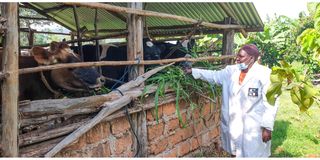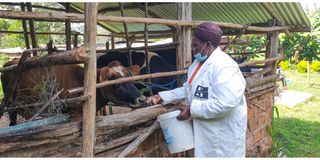Zeituni Sisters milking opportunity in dairy farming

Rose Kajangara, chairperson of Zeituni Sisters, tends to her dairy cows at her home in Kakrao village, Migori County on October 12, 2021.
What you need to know:
- After retiring as an early childhood development teacher, Rose Kajangara, a widow, joined other women and formed a women group which they named Zeituni sisters.
- In 2010 the group got Sh150,000, and invested in poultry keeping.
- In 2012, they sold the bulk of their chicken and embarked on dairy farming.
- Tapping into the county’s growing dairy opportunities, Zeituni Sisters are making more money in milk production than from poultry keeping.
Rose Kajangara’s daily routine starts at 6am. Her farmhands wake up at 5am and by the time she is up; they have already milked her three cows.
She then packages the milk into aluminium milk cans, which are then distributed to families in the neighbourhood and nearby cooperatives.
On average, Ms Kajangara delivers 20 litres of milk a day, making a profit of Sh1,800 during peak dairy seasons. She then prepares feeds for the chicken before supervising ongoing progress at her four-acre farm.
It wasn’t always like this. After retiring as an early childhood development teacher, Ms Kajangara, a widow, joined other women and formed a women group which they named Zeituni sisters.
Armed with Sh50,000 saved from table banking, the group comprising 20 members, applied for a loan from the Women Enterprise Fund in 2010.
The group tried their hands in poultry keeping instead.
Poultry keeping
“When we heard about the Women Enterprise Fund in 2010, we applied and got Sh150,000, which we invested in poultry keeping. We divided the poultry among the 20 group members. I sold the eggs and chicken to restaurants within Migori town, while other members supplied nearby colleges with chicken,” recounts Ms Kajangara.
In 2012, the group decided to sell the bulk of their chicken and embarked on dairy farming. They applied for a second loan with which they bought a heifer.
“We agreed that each member would get a calf sired by the cows and currently, each member has their own cow,” says Ms Kajangara, who chairs the group.
Tapping into the county’s large and growing dairy opportunities, Zeituni Sisters were making more money in milk production than from poultry keeping. This helped them repay the loans in good time.
“Consider the number of people in Migori town, for instance, who take tea with milk every morning and afternoon, leave alone the entire county, '' she says, as she makes her way through her one-acre farm where three dairy cows are enclosed.
“That is a lot of milk. That’s an opportunity we saw as a group and tapped the little resources we had then.”

Ms Kajangara, like other group members, has three cows that produce 40 litres of milk daily.
And the women have never looked back. They have since ventured into producing probiotic yoghurt, which they supply locally.
Ms Kajangara, like other group members, has three cows that produce 40 litres of milk daily. This helps in sustaining milk supply to customers and yoghurt production.
After setting aside five litres for domestic use, she supplies 20 litres of fresh milk to neighbours, while the remaining 15 litres is preserved for yoghurt, which she sells locally to road construction workers tending the Kisii-Migori highway.
A litre of yoghurt retails at Sh100, giving her a daily profit of Sh1,500.
“From the proceeds, I can comfortably take care of my grandchildren’s school fees and pay my two farmhands in good time,” says Ms Kajangara.
Jane Ogonda, another member of Zeituni Sisters, says the dairy business has immensely improved her life.
For her, the 25 litres her cows produce is like a dream come true.
“I am actively involved in making yoghurt, which I also sell locally. This has helped sustain my children in school alongside the vegetable business I run,” she says.
A litre of milk currently goes for Sh60 but she plans to raise it to Sh80 following the rising demands and high costs of input.
Rising demand
“The project is food secure since we target mostly the vulnerable, especially the sick, the elderly and lactating mothers,” she says.
The group is, however, concerned that they say cannot meet the rising demand for their products.
“What we produce is way too low in meeting the rising demand for milk, especially in Migori town. We are seeking more funding to buy more animals,” Ms Kajangara says.
They also require milk pasteurizers to enable them consistently produce milk.
“We have been processing our yoghurt and selling locally since we lack processing machines, and this has affected the pricing of our commodity.”
Covid-19 too, adversely affected the group’s operations and currently, they are struggling to cope.
Mary Odera and Winnie Ochiel say they had rented an office in 2007 from where the group conducted most of their businesses, but the pandemic destabilised their activities.
“We had to vacate the office and scale down our operations as we could not sustain the rent payment. Currently, we conduct our meetings at home. Although we still have table banking, most of our businesses are affected negatively.” Ms Ochiel says.
The group is upbeat that with the reopening of the economy, they will secure funding to boost their production.
“If we can get more funding, our production will most likely shoot as we will be able to buy more dairy cattle,” she says.





